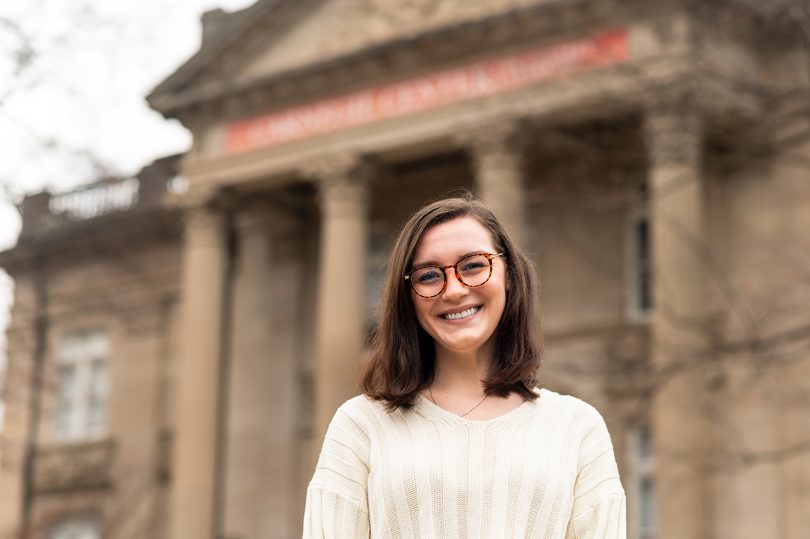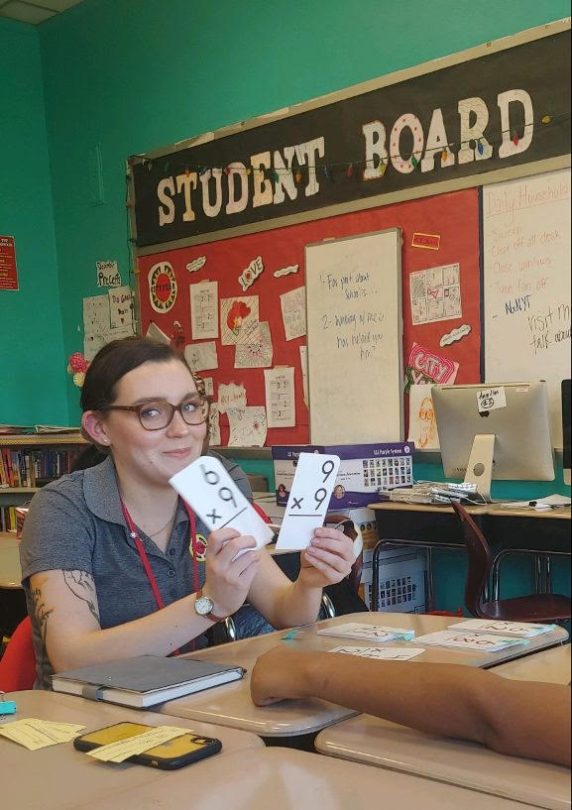
Transylvania University sophomore Valerie Roberts is an education and political science double major from Frankfort, Kentucky. Lillien Hudson ’22 recently interviewed her about her experience with community engagement in Lexington.
Roberts shares her school’s commitment to service, as expressed through its liberal arts mission.
In what ways are you involved with community engagement?
I am currently the volunteer coordinator for Kentucky Refugee Ministries, and I tutor for the Carnegie Center for Literacy and Learning. I have been a tutor with them for over a year, and I really enjoy it because it is just an hour a week, it’s easy, and I get to hang out with the kid that I tutor. So it’s a nice break from academics and other responsibilities. That’s why I like to do community engagement.
How have you remained active during COVID?
It’s been hard, especially with Kentucky Refugee Ministries, working with students who may not be as technologically literate as required during a pandemic when everything has gone online. I remember, at the beginning of the COVID events, having to go over to my mentee’s house and show them how to do things like turn the camera on. It’s tough to have those same meetings and those same connections, especially during COVID-19. Also, with volunteer recruitment I think right now everybody is just trying to take care of themselves, which I do not blame them for, especially with Transy students having to transition to online learning. I know with me, the module system has been tough to try and juggle along with everything else. Yeah, volunteer recruiting has been very hard. But I’m still trying to reach out, trying to make connections through Kentucky Refugee Ministries, so that people can at least get started. When things get back to normal, hopefully they can meet their mentees in person. I hope to see my mentee again in person; it’s been a really long time.
Why is community engagement important to you?
I started becoming really interested in community service in high school. My school actually offered a community service class. I ended up taking the class for three semesters, and that was when I started to love service, doing something and seeing the impact it made — even something simple like picking up trash — when I was done, I felt fulfilled. I tried to continue doing the best I can at Transy. I also took a gap year and did an AmeriCorps program where I tutored and mentored sixth graders in Philadelphia. That was the first time I had done any kind of service work full time. That is what got me interested in both the Carnegie Center and KRM, because I worked with many students in marginalized communities.

Is there a change in our community that you hope your involvement will create?
Yeah, for sure. I think that there is a lot of improvement in regards to engagement at Transy. I know that we have many clubs and organizations that work specifically with Transy, but in Lexington there are so many places to branch out, so many places where you can volunteer. For me, community service classes were kind of like a flip switch, and I was like, “Oh, I enjoy doing this; it’s fulfilling, and it’s something that I like, and it’s not a chore.” I think many people think of service as a chore. Though I understand adding more responsibilities, people are apprehensive about doing that — understandably so; we’re swamped. However, I would still really like people to push a little bit harder to do more work outside of the Transy community. There’s a whole world outside of the bubble, the Transy Bubble, that many people haven’t even tapped.
What valuable experiences have you gained throughout your involvement with the community?
It’s nice to see the student I work with at the Carnegie Center every week, see his growth and our relationship change as he does. With KRM especially, being with somebody while they are in one of the most difficult and confusing parts of their life is, to me, very fulfilling. I did a “What Matters to Me and Why” with political science professor Stephen Hess quite a few months ago. He talked about his work with refugees and about how nobody wants to leave their home to go to another country. Many of us as Americans can’t even fathom what that would be like to be in an environment that is so drastically different from our own and for that to be every day, being in school and constantly confused about certain things. It’s tough, and although I’m not ESL certified or a social worker, just me being there and answering simple questions — like how to talk to a librarian about what resources they have available — matters to the student that I work with in KRM. So, to me, that’s the most fulfilling part: to know that I’m just a student and I can still be valuable in that way.
How has your time at Transy impacted the way you engage with the community?
I’m from Frankfort, not too far from Lexington. However, it’s still a very different community, and being involved in community engagement has really allowed me to set up my roots in Lexington. I’ve been able to make the connections throughout the city that I know will last beyond graduating from Transy. Hopefully, me being involved in the Lexington community will be something that I continue to do for a while, and it’s really made this place feel like home.
What are the ways you would like to see others get involved in the community?
Right now with COVID, it’s tough. So I can understand people not wanting to begin involvement in service. So, trying to become more involved in ways that are easy for them, even if it’s an internship — making that connection with an organization I think makes a world of difference. I think we get caught up in the motions and say, “I won’t be able to do anything significant until I get my diploma,” but that’s not true at all. We need to change that way of thinking because you can make a difference while in college, and you gain a lot from this experience. It’s not just service to others. It’s also service to yourself in a way; you grow personally, and you’re able to network and make connections with others. There’s a niche that everybody can become involved in and do something that they would enjoy. I know that for a fact, so finding that for somebody is really all that needs to be done for them to reap the rewards of how fulfilling service can be.
Lillien Hudson is a psychology major and work-study student in the Office of Marketing and Communications.

